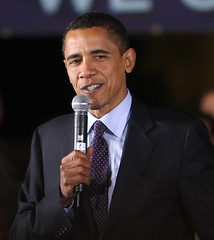Days ahead of his visit to India, President Barack Obama has signaled he will take a tough stance on prickly issues such as outsourcing, and limits on exports of sensitive technology.
Indian news agency Press Trust of India (PTI), which interviewed Obama on Wednesday, quoted him as saying it was "very difficult and complicated" to meet key Indian expectations such as ending a ban on U.S. exports of dual-use technology to India.
New Delhi wants the United States to allow exports of dual-use technology, which can be used for both civilian and military purposes and which was banned after India carried out nuclear tests in 1998.
"Our teams continue to work hard to reach an agreement that strengthens the international non-proliferation system while treating India in a manner that is consistent with our strategic partnership," Obama told PTI news agency.
Obama's visit will come days after his Democrats were punished in mid-term elections over the sluggish economic recovery and high domestic unemployment. These problems have heightened tensions over the outsourcing of American jobs to low-cost countries like India.
The visit puts the spotlight on India's $60 billion IT sector, which argues it is a creator of jobs in the United States and should not be blamed for high unemployment.
An increase in U.S. visa fees, a ban on offshoring by the state of Ohio and the industry's portrayal in campaign publicity as a drain on U.S. jobs has set a frosty tone in India ahead of the visit, which begins on Saturday.
Calling on India to further open its markets to U.S. companies, Obama said: "Our market is open to products, services and investment from around the world. We believe other countries, including India, should give U.S. companies the same access to their markets that we give."
U.S. firms like General Electric and Westinghouse Electric are unhappy about an Indian civil nuclear law that will see suppliers like them liable for damages in case of a nuclear accident.
Obama said there were concerns over the law, but the two nations were working to resolve them.
Obama said he expected "big items on the agenda" which would help further broaden ties between the two countries.
New Delhi would welcome a show of support by Washington for India's long-standing bid for a permanent place on the U.N. Security Council, but Obama said the issue was difficult.
"I do also expect to discuss India's role as an actor on the global stage during my visit," he said, describing India as the "cornerstone" of American engagement in Asia. (Reuters) -(Reporting by C.J. Kuncheria; Editing by Krittivas Mukherjee and Daniel Magnowski)
Related Articles
- Obama's Delhi trip: More style than substance (rupeenews.com)
- Outsource Obama if he takes more jobs to India (viewstimes.com)
- A tepid reception for Obama in Delhi spells failure (rupeenews.com)
- Obama to get a friendly but subdued welcome in Delhi (thedawn.com.pk)
- Delhi dilemma of President Obama (pakistanakhbar.com)
- Muted reception for Obama in India (thedawn.com.pk)
- India sees itself as a Republican 'Red state' nostalgic for Bush era (rupeenews.com)
- Running to India for a $12 billion sale? (pakistanindependent.com)
- Delhi: Obama won't talk bad about Outsourcing, Pakistan, China (thedawn.com.pk)



No comments:
Post a Comment